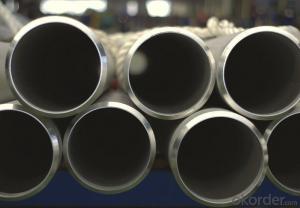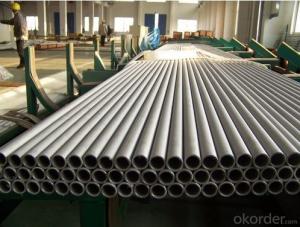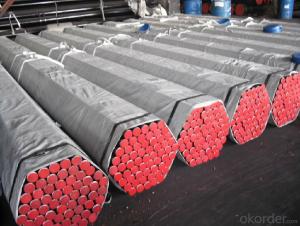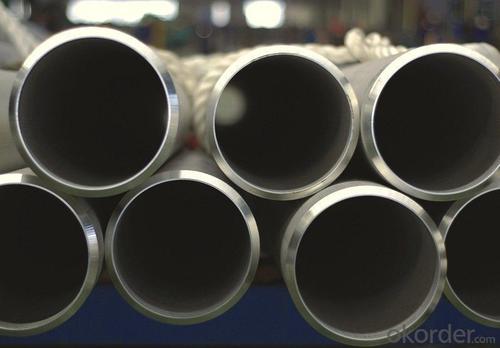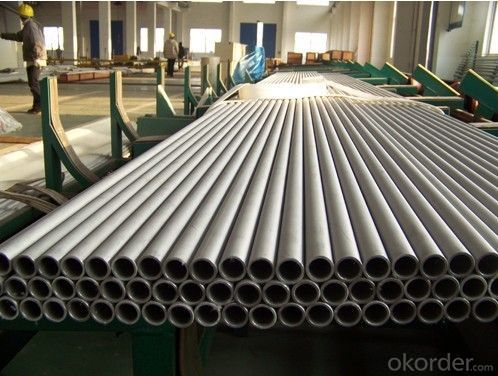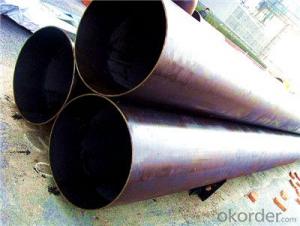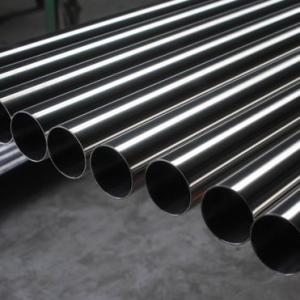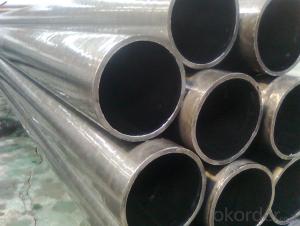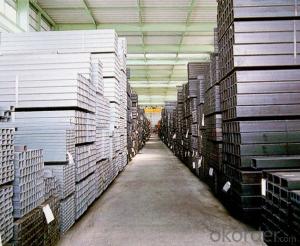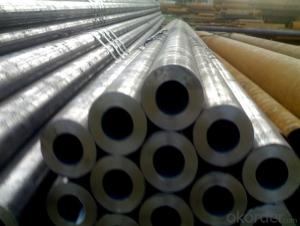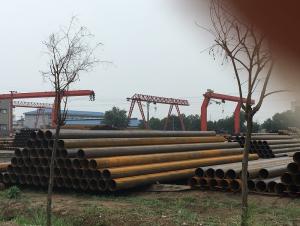Austenitic Seamless Steel Pipe Good Corrosion Resistance
- Loading Port:
- Tianjin
- Payment Terms:
- TT OR LC
- Min Order Qty:
- 1 m.t.
- Supply Capability:
- 3000 m.t./month
OKorder Service Pledge
OKorder Financial Service
You Might Also Like
Product Description:
1、Structure of seamless steel pipe 304 Description:
A large amount of Seamless Steel Pipes 304 are offered to the clients at cost effective rates. These pipes are extremely durable, resistant to corrosion and have high tensile strength. Our pipes are used in nuclear plants, power plants, refineries and construction industry across the country. Furthermore, we are capable of providing these seamless pipes to the clients in bulk quantity.
2、Main Features of the seamless steel pipe 304:
• High manufacturing accuracy
• High strength
• Small inertia resistance
• Strong heat dissipation ability
• Good visual effect
•Reasonable price
3、seamless steel pipe 304 images:
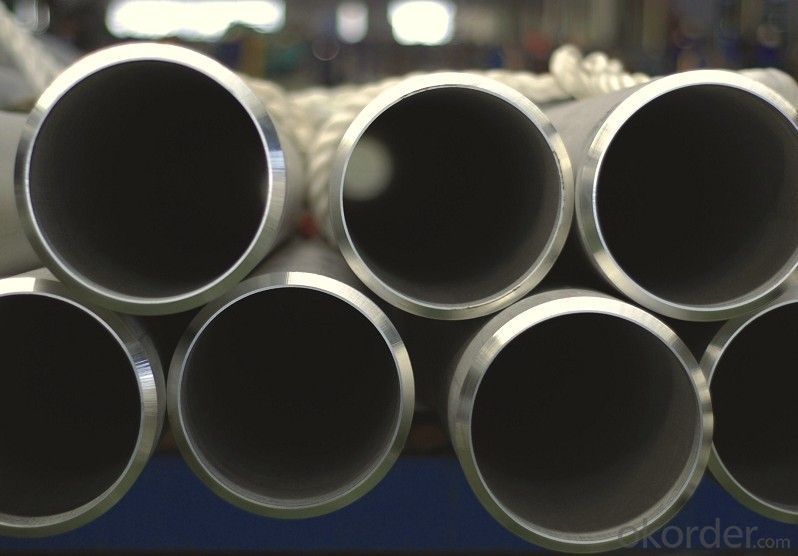
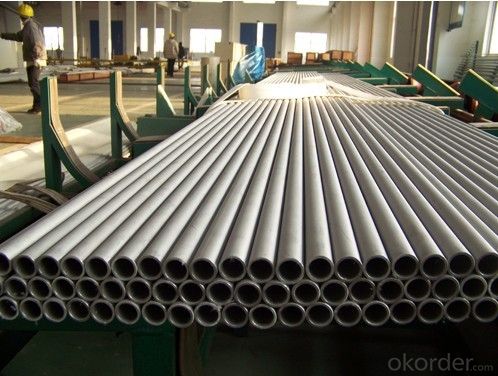
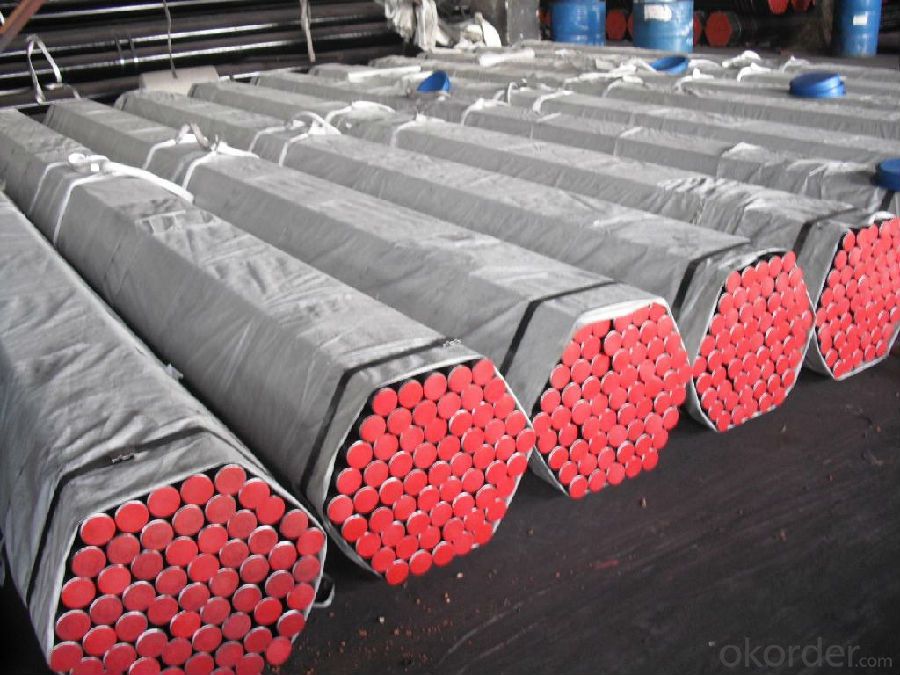
4、seamless steel pipe 304 Specification:
1.Type:seamless
2.Standard:ASTM
3.Material Grand:304 stainless steel
4.Size:OD8-1000MM*WT0.5-80MM
Standard: | JIS, AISI, ASTM, GB, DIN, EN | Place of Origin: | Zhejiang China (Mainland) | Brand Name: | SR |
Type: | Seamless | Steel Grade: | 300 Series | Certification: | ISO |
Thickness: | 0.8mm--22mm | Outer Diameter: | 20mm--800mm | process: | Cold drawn,cold roll |
product: | seamless pipe/tube,elbow,tee,reducer | MOQ: | 1000kg | standard: | A312/A213/A269/A249/A358/A268/A789/ |
Packaging & Delivery
Packaging Detail: | Standard seaworthy package(wooden boxes package,pvc package, and other package) |
Delivery Detail: | 5-30 days after confirmation of prepayment depending on quantity |
Tolerance | a) Outer Diameter: +/- 0.2mm b) Thickness: +/- 0.02mm c) Length: +/- 5mm |
Surface | 180G, 320G, 400G Satin / Hairline 400G, 500G, 600G or 800G Mirror finish and so on. |
Specification | ASTM A213,ASTM A312,ASTM A269,ASTM A778,ASTM A790,DIN 17456,DIN 17458,JIS G3459,JIS G3463 etc |
Material | TP304,TP304L,TP304H,TP304/304L,TP316,TP316L,TP316/316L,TP310,TP317, TP317L,TP321,TP321H,TP347,TP347H,S31803,S32205(Duplex),904L etc |
Application range | Stainless steel pipe applies to construction field, ships building industry, petroleum & chemicalindustries, war and electricity industries,food processing and medical industry, boiler heat exchanger,machinery andhardware fields. Stainless steel pipe can be made accordingto the customers requirements. |
Delivery conditions | Annealed, pickled & polished. |
Note | We can produce other standard as the customers’ requirement. |
5、FAQ of seamless steel pipe 304:
①How is the quality of your products?
Our products are manufactured strictly according to national and internaional standard, and we take a test
on every pipe before delivered out. If you want see our quality certifications and all kinds of testing report, please just ask us for it.
Guaranteed: If products’ quality don’t accord to discription as we give or the promise before you place order, we promise 100% refund.
②How about price?
Yes, we are factory and be able to give you lowest price below market one, and we have a policy that “ for saving time and absolutely honest business attitude, we quote as lowest as possible for any customer, and discount can be given according to quantity”,if you like bargain and factory price is not low enough as you think, just don’t waste your time.Please trust the quotation we would give you, it is professional one.
③Why should you chose us?
Chose happens because of quality, then price, We can give you both.Additionally, we can also offer professional products inquiry, products knowledge train(for agents), smooth goods delivery, exellent customer solution proposals.Our service formula: good quality+good price+good service=customer’s trust
SGS test is available, customer inspection before shipping is welcome, third party inspection is no problem.
Any question, pls feel free to contact us !
- Q: How are steel pipes classified based on their schedule?
- Steel pipes are classified based on their schedule, which refers to the thickness of the pipe wall. The schedule classification is denoted by a number, such as 10, 20, 40, 80, etc., with higher numbers indicating thicker walls.
- Q: Can steel pipes be used for wastewater disposal?
- Yes, steel pipes can be used for wastewater disposal. Steel is a durable and corrosion-resistant material, making it suitable for transporting and disposing of wastewater safely and efficiently.
- Q: How are steel pipes used in wastewater treatment plants?
- Steel pipes are extensively used in wastewater treatment plants for various purposes such as transporting wastewater, carrying chemicals, and supporting infrastructure. These pipes are durable, corrosion-resistant, and can withstand high pressure, making them ideal for conveying wastewater and other fluids within the plant. Additionally, steel pipes are often used in the construction of wastewater treatment plant structures and support systems due to their strength and longevity.
- Q: How are steel pipes used in the construction of railways and transportation systems?
- Steel pipes are commonly used in the construction of railways and transportation systems for various purposes. One major use of steel pipes in these applications is for the construction of bridges and tunnels. Steel pipes are often used as structural components in the construction of bridges, providing support and stability to the overall structure. In tunnels, steel pipes are used as ventilation shafts, allowing for the circulation of air and removal of fumes, thus ensuring the safety of passengers and workers. Additionally, steel pipes are used for the construction of railway tracks. They are used as supports for the tracks, providing a stable base for the trains to travel on. Steel pipes used in railway tracks are typically coated or galvanized to protect them from corrosion and ensure their longevity. Moreover, steel pipes are used for drainage systems in railway stations and transport hubs, ensuring proper water management and preventing flooding. Another important application of steel pipes in transportation systems is for the construction of signposts and streetlights. Steel pipes are often used as the main structural element in these structures, providing strength and durability. They can be easily fabricated and shaped to meet the specific design requirements, making them a popular choice for these applications. Overall, steel pipes play a crucial role in the construction of railways and transportation systems by providing structural support, ensuring proper ventilation, facilitating drainage, and serving as the main components in various structures. Their strength, durability, and versatility make them an ideal choice for these applications, contributing to the safe and efficient operation of transportation networks.
- Q: How long do steel pipes last?
- The lifespan of steel pipes can vary depending on several factors, including the quality of the steel used, the environment in which they are installed, and the maintenance and care given to them. Generally, steel pipes are known for their durability and longevity. With proper installation and regular maintenance, steel pipes can last for several decades, often exceeding 50 years. However, it is important to note that external factors such as corrosion, exposure to extreme temperatures, and chemical reactions can significantly affect their lifespan. Regular inspections, timely repairs, and protective coatings can help extend the life of steel pipes, ensuring their reliability and functionality for many years.
- Q: How are steel pipes used in seaport infrastructure?
- Steel pipes are commonly used in seaport infrastructure for various purposes such as constructing piers, docks, and wharves. They are also used in the construction of offshore platforms and maritime structures like breakwaters and jetties. Steel pipes provide the necessary strength and durability to withstand the harsh marine environment and are used for the transportation of water, fuel, and other fluids within the port. Additionally, they are employed in the construction of pipelines for the loading and unloading of cargo ships, as well as for dredging and marine construction activities.
- Q: Are steel pipes suitable for industrial applications?
- Steel pipes are an excellent choice for industrial applications. They come with several advantages that make them the preferred option in various industries. Firstly, their strength and durability are exceptional, enabling them to withstand high pressure and heavy loads. This makes them perfect for transporting liquids, gases, and solids. Furthermore, steel pipes exhibit high resistance to corrosion, a critical feature in industrial settings where exposure to harsh chemicals, moisture, and extreme temperatures is common. Their corrosion-resistant properties ensure a longer lifespan and reduce the need for frequent maintenance and replacements. Additionally, steel pipes have a smooth interior surface, minimizing friction and allowing for efficient material flow. This is particularly vital in industries like oil and gas, where the smooth flow of fluids is essential for proper operations. Moreover, steel pipes offer a wide range of sizes and thicknesses, allowing for customization and flexibility in design. They can be easily welded and connected, facilitating simple installation and modification as per specific industrial requirements. Overall, steel pipes provide a combination of strength, durability, corrosion resistance, and versatility, making them highly suitable and widely used in various industrial applications such as oil and gas, construction, water treatment, power generation, and chemical processing.
- Q: What is the difference between steel pipe and aluminum pipe?
- Steel pipes and aluminum pipes differ primarily in their composition and physical properties. Steel pipes are composed of iron and carbon, with added elements for strength and corrosion resistance. In contrast, aluminum pipes are made entirely of lightweight and highly corrosion-resistant aluminum. The weight of the pipes is a significant distinction. Steel is denser than aluminum, making steel pipes heavier and more robust. This characteristic makes steel pipes ideal for applications requiring structural strength and load-bearing capabilities. On the other hand, aluminum pipes offer advantages due to their lightweight nature. They weigh only about one-third of steel pipes, making them easier to handle, transport, and install. This lightweight property is especially beneficial in industries such as aerospace and automotive, where weight reduction is crucial. Corrosion resistance is another important consideration. Steel pipes are prone to rust and corrosion, especially in moist or corrosive environments. To address this issue, steel pipes are often coated or galvanized. In contrast, aluminum pipes naturally resist corrosion due to the formation of a protective layer of aluminum oxide on their surface. Cost is also a factor to consider. Generally, steel pipes are more cost-effective due to lower raw material and manufacturing costs. However, long-term maintenance costs and lifespan may vary between steel and aluminum pipes, so specific requirements and durability should be taken into account. In conclusion, the difference between steel and aluminum pipes lies in their weight, strength, corrosion resistance, and cost. Steel pipes are heavier, stronger, and more prone to rust and corrosion but are generally more cost-effective. Aluminum pipes are lightweight, corrosion-resistant, and costlier but offer advantages in weight reduction and specific applications requiring corrosion resistance. The choice between steel and aluminum pipes depends on the project's needs and desired properties for optimal performance.
- Q: Can steel pipes be used for underground utility lines?
- Yes, steel pipes can be used for underground utility lines. Steel pipes are known for their durability and strength, making them suitable for underground applications. They can withstand heavy loads, pressure, and corrosion, which are essential factors for utility lines that are buried underground. Additionally, steel pipes can be welded or threaded together, allowing for easy installation and maintenance.
- Q: Are steel pipes resistant to impact or external forces?
- Yes, steel pipes are generally resistant to impact or external forces due to their inherent strength and durability. They can withstand high pressure, heavy loads, and harsh environmental conditions, making them suitable for various applications, including construction, transportation, and industrial purposes.
Send your message to us
Austenitic Seamless Steel Pipe Good Corrosion Resistance
- Loading Port:
- Tianjin
- Payment Terms:
- TT OR LC
- Min Order Qty:
- 1 m.t.
- Supply Capability:
- 3000 m.t./month
OKorder Service Pledge
OKorder Financial Service
Similar products
Hot products
Hot Searches
Related keywords
